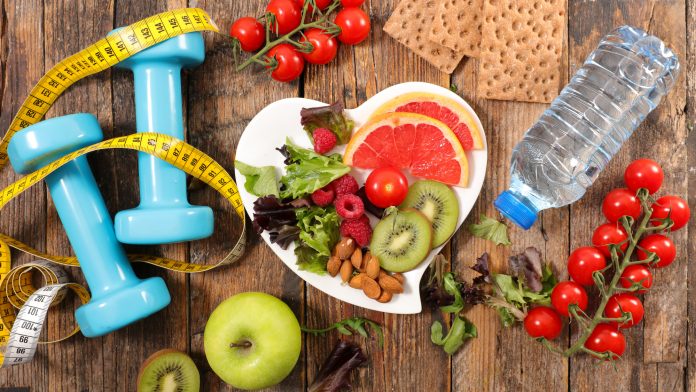How healthy are you? Do you have a healthy diet? Do you exercise regularly? Do you drink at least eight glasses of water a day? Do you get enough sleep every day? Do you live a healthy lifestyle?
Our body is our temple and we need to take care of it. Do you know that over 70% of Americans are either obese or overweight?[1] That’s insane! Think of your body as your physical shell to take you through life. If you repeatedly abuse it, your shell will wear out quickly.
Life is beautiful and you don’t want to bog yourself down with unnecessary health problems. Today, your vital organs may be working well, but they may not be tomorrow. Don’t take your health for granted. Take proper care of your body.
Good health isn’t just about healthy eating and exercise — it’s also about having a positive attitude, a positive self-image, and a healthy lifestyle. In this article, I share 45 tips to live a healthier life. Bookmark this post and save the tips, because they will be vital to living a healthier life.
1.Drink more water. Most of us don’t drink enough water every day. Water is essential for our bodies to function. Do you know over 60% of our body is made up of water? Water is needed to carry out body functions, remove waste, and carry nutrients and oxygen around our body. Since we lose water daily through urine, bowel movements, perspiration, and breathing, we need to replenish our water intake.
Water
Furthermore, drinking water helps in losing weight. A Health.com study carried out among overweight or obese people showed that water drinkers lose 4.5 more pounds than a control group! The researchers believe that it’s because drinking more water helps fill your stomach, making you less hungry and less likely to overeat.
The amount of water we need is dependent on various factors such as humidity, your physical activity, and your weight, but generally, we need 2.7-3.7 liters of water intake per day.[2] Since food intake contributes about 20% of our fluid intake, that means we need to drink about 2.0-3.0 liters of water or about 8-10 glasses (now you know how the 8 glasses recommendation came about!). One way to tell if you’re hydrated — your urine should be slightly yellow. If it’s not, like it’s dark yellow or even orange, you’re not getting enough water! Other signs include dry lips, dry mouth, and little urination. Go drink some water first before you continue this article!
2.Get enough sleep. When you don’t rest well, you compensate by eating more. Usually, it’s junk food. Get enough rest and you don’t need to snack to stay awake. Also, lack of sleep causes premature aging and you don’t want that! Read: Having Insomnia? How to Get a Perfect Night’s Sleep.
3.Meditate. Meditation quietens your mind and calms your soul. If you don’t know how to meditate, don’t worry. Learn to meditate in 5 simple steps.
4.Exercise. Movement is life. Research has shown that exercising daily brings tremendous benefits to our health, including an increase in lifespan, lowering of risk of diseases, higher bone density, and weight loss. Increase the activity in your life. Choose walking over transport for close distances. Climb the stairs instead of taking the lift. Join an aerobics class or a dance class. Pick a sport of your liking (see tip #5).
5.Pick exercises that you enjoy. When you enjoy a sport, you naturally want to do it. Exercise isn’t about suffering and pushing yourself; it’s about being healthy and having fun at the same time. Adding variation in your exercises will keep them interesting. What exercises do you like and how can you include them in your routine?
6.Work out different parts of your body. Don’t just do cardio (like jogging). Give your body a proper workout. The easiest way is to engage in sports since they work out different muscle groups. Popular activities where you can get a good body workout are trekking, hiking, swimming, basketball, tennis, squash, badminton, yoga, and frisbee.
7.Eat fruits. Fruits have a load of vitamins and minerals. Do you know that oranges offer more health benefits than vitamin C pills? As much as possible, consume your vitamins and minerals through your diet rather than through pills. I eat a variety of fruits every morning and they energize me. Satisfy your palate with these nutritious fruits: Banana, Papaya, Kiwi, Strawberries, Blueberries, Blackberries, Raspberries, Watermelon, Rockmelon, Honeydew, Peach, Apple, Grapefruit, Pomelo, Mango, Orange.
Fruits.
8.Eat vegetables. Vegetables are the source of many nutrients and minerals like folate, vitamin K, folate, vitamin A, manganese, and potassium, not to mention dietary fiber which is important for good gut health. There are two types of vegetables: Starchy vegetables like potato, sweet potato, yam, and pumpkin; and non-starchy vegetables like kale, arugula, spinach, broccoli, brussels sprouts, long beans, tomato, cucumber, and mushroom (technically a fungus). Some vegetables are slightly starchy and hence fall in the middle: Corn, green peas, carrot, artichoke, beetroot, cauliflower, and beans (technically legumes). All vegetables are important and enrich our diet.
I typically have raw salads for lunch every day with a variety of vegetables, then a cooked dinner with grains, potatoes/sweet potatoes, and other delicious vegetables. You want to have a variety of vegetable intake to strengthen your immune system (see tip #9).
9.Pick different-colored fruits/vegs. Always consume a wide variety of fruits and vegetables of different colors. Firstly, fruits and vegetables with different colors represent different anti-oxidant content, which removes free radicals that damage our cells and fights inflammation in our body. Secondly, when we eat a large diversity of fruits/vegetables, it creates a wide variety of good bacteria in our gut, which creates a strong defense line between us and the environment, improves our immune system, and strengthens our long-term health.
Eat fruits/vegetables of different colors: White (Bananas), Yellow (Pineapples, Mango), Orange (Orange, Papaya), Red (Apple, Strawberries, Raspberries, Tomatoes, Watermelon), Green (Avocado, Kale, Lettuce, Cucumber), Purple/Blue (Blackberries, Prunes). Here’s a full list under the color wheel.
If you have existing gut problems, be careful about eating excessive amounts of fiber as it can cause digestion and constipation issues. For those with existing gut problems, excessive fiber intake can cause slow down colonic transit time (due to bulkier stools), make it more difficult to move your bowels, which leads to constipation, piles, anal fissure. It can also cause gas and bloating.[3] Consume low-fiber foods to let your gut heal, juice your fruits/vegetables to get their nutrients, and then slowly build up your whole fruit/vegetable intake.
10.Cut down on processed food. Processed food is not good because (a) most of the nutritional value is lost in the creation of these foods, and (b) the added preservatives are bad for our health. Many processed foods contain a high amount of salt which leads to higher blood pressure and heart disease. In general, the more ingredients a food has on the label (ending with ‘ite’ or ‘ate’), the more processed it is. Go for less processed food such as a baked potato over chips, fresh fruit over canned fruit, and intact grains over white bread.






























